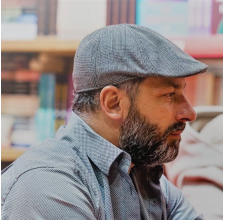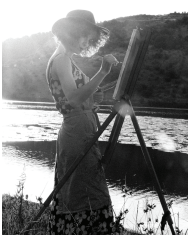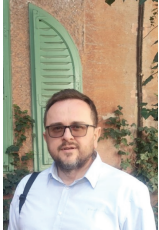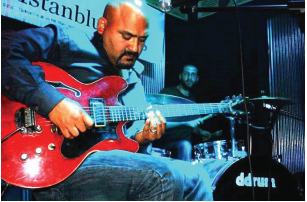Dejan Vasilevski was born in
1975 in Skopje, Macedonia.
He is a translator from Serbian,
Croatian, Montenegrin and
Bosnian language, and a poet
and short novels writer. He has
won several awards for his short
novels and his poems and was
published in several literature
magazines and one anthology.
Dejan Vasilevski participated
in several literature readings
and festivals (twice at Struga
Poetry Evenings). Some of his
short novels and poems have
been translated to Serbian and
Bulgarian.
1 – It depends on various circumstances, as well as on my inner state at a given time
when I am writing or translating. Sometimes the environment really affects me and
there is a direct connection and a real relationship between my creative activity and the
environment. Sometimes, it happens that I isolate myself, that I don’t care where I am
and what the environment is like. These are different states of mind. Of course, there is
a big difference between being in the place where you live and being somewhere else.
With the change itself, the relationship between the creative activity and the
environment becomes very important. My creativity is further emphasized by the
current social and cultural environment, due to the fact that I am doing my translation
residency in Belgrade. It’s one thing when you work on the material in your “safe”
environment at home, and another when you step outside the patterns of recognition and
throw yourself into the unknown. Especially in a city like Belgrade, which offers
something new at every corner, and every street reveals something different, offers
different creativity, different art than the one at home, right? And especially because of
the daily communication in the language in which I am currently translating, so the
possibility of learning new words, phrases, terms and situations and implementing them
in the translation, further increases the creativity and quality of what is being done.
2 – Most of what I have written is about my hometown, that is, the city where I live, and
about my feelings, emotions, experiences around my Skopje, my living in it, etc. Skopje
is very important to me as a city that I feel is my own. Of course, my direct personal
environment, because it built me into the person I am now, is a very important factor for
me as a writer. I do not consider that the country in which I live is significant for me as
an author. I have very rarely or never been inspired by the country I live in or stay in for
a period of time. However, I am more inspired and have been inspired by the urbanity of
a place, that is, the place in which I live or stay, its streets, houses, buildings, parks, and
hidden corners, I want to represent real characters in real situations and places. If I had
to give one term that was the most inspiring for me, then it would be – the (unknown)
street!
3 – I am currently on a translation residency in Belgrade, Serbia, and in April of this
year I was on a translation residency in Cetinje, Montenegro. Although I know Belgrade
particularly well from before, as I have often traveled and stayed in Belgrade, mostly
because of the Book Fair, and also because of music events, I must emphasize that the
city offers much more than what I have experienced so far. In fact, I feel like I’ve only
scratched a little below the surface of the city during all my visits here so far. My
experience as a resident of the city I chose in the context of this program is unique. I
made many contacts with people from the fella, and in addition to my participation in
the Poetry Slam evening that took place in the premises of KROKODIL, on October 30,
at which I was invited to perform before, I was additionally invited to present my poetry
at a poetry evening, within at the event organized by the Spoken Words RS team, on
November 10, where around twenty poets from Serbia took part, and I as a guest from
Macedonia and another poetess from Russia. It’s something that was arranged after my
performance at the Poetry Slam evening in KROKODIL, so I can say that the story
around my stay in Belgrade is successfully spreading through literary circles, meeting
new artists and experiencing new arts! Although I am only halfway through my stay as
we do this interview, I have already made several contacts that offer opportunities for
collaboration and deepening of what we do in the region in the literary field. And
finally, what I’m here for – the work of translating the poetry collection Povremena
poput vikend naselja (Temporary as a weekend settlement) by the poetess Masha
Senicic, with whom I already have meetings, and at those meetings we discuss the
problems I encounter when translating her poems, we “iron out” situations, talk about
metrics and punctuation, what’s “between the lines/verses”, etc.
4 – Writing poems, haiku poems, short stories, that’s something I very easily separate
from translation, which I see as a completely different category from creating art. I used
to write to channel the emotions that wanted to come out and it was mostly poetry, then
I wrote because I wanted to show the city, the society in which I live through my prism,
through my view, through my eyes, and how it all looks to me. That is the time when I
wrote short stories intensively. And today, I mostly write haiku poems, because I want
to capture the moment I live in, the moment I see and feel. On the other hand, although I
work as a proofreader in Ars Lamina Publishing house in Macedonia, a few years ago I
decided to start translating, somewhat revolted by the low-quality translations from
regional languages that appeared on the Macedonian publishing market. I felt that I
could do it better given my experience as both a proofreader and an author, a
combination that I felt could offer greater quality. Then somehow I found myself in
translation. So far I have translated 12 books by authors from Croatia, Serbia and
Montenegro. And I must mention that during this period, translation completely
occupies my creativity and fulfills me, so I have no intention of stopping with
translation, although I only translate what I like as a reader. So, I have translated Jurica
Pavicic and Masha Kolanovic from Croatia, Stefan Ticmi, Nele Karajlic and Urosh
Petrovic from Serbia and Nikola Nikolic from Montenegro, and now I am translating
the Serbian poetess Masha Senicic.







